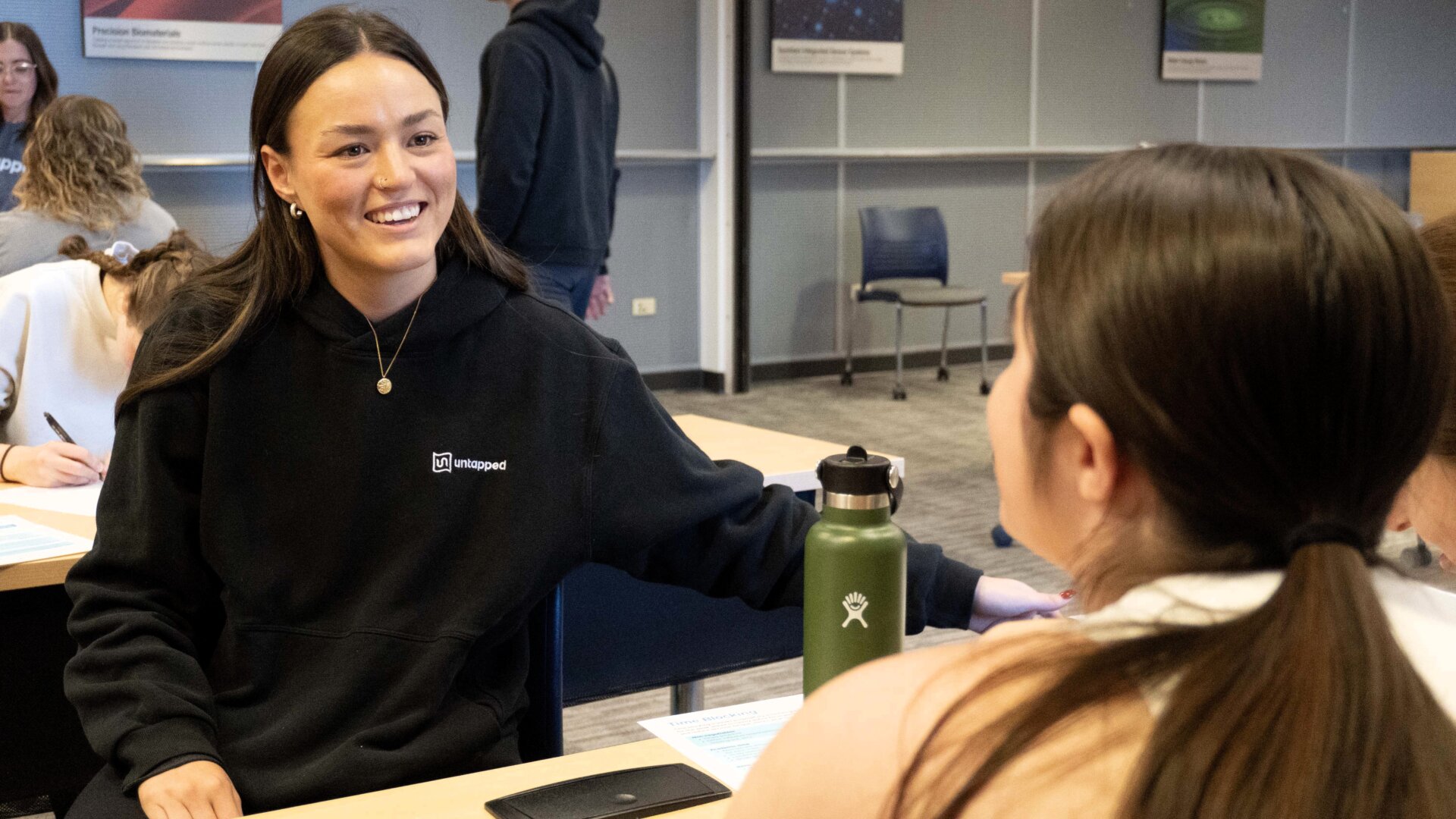When I first started college and got independence, I felt completely out of my depth when it came to simple tasks like talking to professors. I assumed I’d figure it out when the time came, but when I tried, I was so awkward I felt like I’d stepped into the wrong room. Thankfully, a friend on the football team pulled me aside and taught me what to say, turning nerve-wracking encounters into productive conversations.
Then there was the time I tried to do laundry. The first time I used a laundry machine in college, my clothes came out smelling awful because I didn’t know how much detergent to use or how to work the machine properly. I was so embarrassed by this that I avoided laundry for weeks. Finally, I tagged along with a friend to the laundromat, quietly watched what he did, and pretended I knew how to work the machines. After that, I was able to handle it on my own.

It’s small skills like these that often prevent young adults from doing what they need to do. It’s not that they don’t want to be responsible—it’s just that they don’t know how. Overwhelm sets in when they don’t know where to start or how to overcome even minor challenges.
This is where executive function skills come into play. As a parent, you can help guide your child through this transition by supporting the development of these skills, making the adulting process less daunting.
What Are Executive Function Skills?
Executive function skills are the mental processes that help us plan, organize, and complete tasks. These skills help us tackle everyday challenges, like remembering to pay the electricity bill, managing back-to-back appointments, or maintaining friendships despite a hectic work schedule. Without strong executive function, young adults may struggle to start tasks, meet deadlines, or manage their time effectively.
Here’s a breakdown of key executive function skills that young adults need to navigate adult responsibilities:
- Getting started: Overcoming procrastination and starting tasks—like applying for a job or scheduling an appointment—is crucial for meeting deadlines and staying organized.
- Planning and staying organized: Balancing school, work, and personal commitments requires thoughtful planning and organization. This helps young adults avoid feeling overwhelmed when they need to compare healthcare plans or budget for monthly expenses.
- Time management: Managing multiple responsibilities can be tricky. By learning to allocate their time effectively, young adults can balance work, personal time, and obligations, reducing stress and keeping things on track.
- Emotional regulation: Adulting comes with emotional ups and downs. Stress from finances or work is unavoidable, but learning to handle these emotions constructively keeps young adults focused on what matters and staying resilient.
- Self-understanding: This skill involves assessing progress and adjusting plans when needed. Whether it’s evaluating a job search strategy or figuring out how to manage finances better, self-understanding helps young adults pivot when necessary.

Why Executive Function Skills Are Needed for Adulting
For young adults, Adulting 101 is all about learning how to manage responsibilities and reach personal goals. But without solid executive function skills, even simple tasks—like paying rent on time, finding a healthcare plan, or scheduling a doctor’s appointment—can become overwhelming.
Young adults aren’t always equipped with these skills when they leave home, but the good news is that executive function can be developed over time. By focusing on these skills, your child can build confidence and learn how to handle adult responsibilities independently.
As a parent, you play an important role in supporting this development by offering guidance, accountability, and encouragement as they navigate independence.
Building Executive Function Skills for Lifelong Independence
The good news is that executive function skills can be developed over time. These skills are often misunderstood as personal flaws or poor character, but that’s not the case. With the right strategies, young adults can strengthen these skills and make adulting much easier. Here’s how:
- Set small, realistic goals: Big goals can be daunting, like running a marathon without training. Start with small, achievable steps, such as saving $100 this month or applying to three jobs. Over time, they will develop the confidence to tackle bigger challenges.
- Create routines: Consistency is key. Help your child establish daily routines for work, study, and self-care. Routines provide structure and make time management more manageable. This will help them create habits that make adulting feel less chaotic and more in control.
- Use positive reinforcement and accountability: Holding your child accountable for their goals while offering positive reinforcement can make a big difference. Praise them when they accomplish tasks, no matter how small.
Research shows that when young adults know what’s expected of them—even if they don’t always like it—they are more likely to follow through. Setting clear expectations and checking in regularly helps reinforce good habits and keeps them on track.
- Encourage time blocking: I once worked with a young woman who struggled to manage her time while balancing a part-time job and college classes. She often missed deadlines because she couldn’t prioritize tasks.
Together, we implemented time blocking—a strategy where she scheduled specific blocks of time for studying, working, and relaxing. By creating this structured approach, she was able to see exactly where her time was going, which helped her stay on track and even enjoy more free time on weekends.
- Check-in while building self-awareness: Regularly check in with your child to help them reflect on how they approach tasks. These check-ins aren’t just about monitoring progress—they’re about helping your child recognize their strengths and areas for improvement. By guiding them to understand how their brain works and adjust their routines accordingly, you empower them to create a life that works for them.

A Success Story: The Power of Building Executive Function Skills for Adulting
I began working with a young man after he failed out of college twice due to struggling with independence. The thought of starting a new task was paralyzing, turning even simple responsibilities into insurmountable obstacles. Even when he was able to begin, any roadblock would make him quickly give up.
Through coaching, we worked on setting clear goals and creating manageable steps for reaching them. We started small—creating a gym routine, making a grocery list, and researching career paths. By regularly checking in and reinforcing these steps, he was able to make real progress. Eventually, he re-enrolled in school to become a paramedic and passed his exams with confidence.
The key to his success wasn’t just completing tasks—it was learning how to define his goals, break them down into smaller steps, and persevere when challenges arise. With the support and the right strategies, he’s now doing well as a paramedic, and he’s built routines that work for him.
Moving Beyond the Fear of Not Launching
Many young adults fear that if they haven’t yet launched into adulthood, they’re failing. Think of launching as a series of small steps, much like climbing a mountain. Each step forward, no matter how small, is progress toward the peak of independence. Developing the habits and skills needed for independence takes time—and often requires trial and error.
As parents, it’s important to remember that executive function skills are learned over time, not something young adults are simply born with. Supporting your child as they work through challenges, rather than stepping in to solve problems for them, helps them build the resilience and strategies they need for long-term success.
Why Coaching Can Help Your Child Develop Independence
While parents can provide valuable guidance, young adults often learn these life skills best through outside mentorship or coaching. Coaches at Untapped Learning help young adults build the executive function skills they need to navigate adult life with confidence.
Our coaching provides the tools and strategies young adults need to build structure in their lives, stay accountable, and tackle responsibilities with confidence.
If you feel your child needs extra support in developing their independence, contact Untapped Learning today to learn how we can help them successfully launch into adulthood.
For More:
Steps to Independence: How to Support (Not Enable) a Child with ADHD
Failure to Launch: Treating It as a Process, Not a Failure
Young Adults are Struggling with Their Mental Health. Is More Childhood Independence the Answer?
Overcoming Failure to Launch Syndrome





